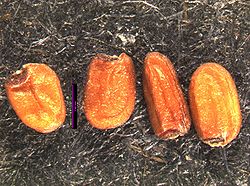Cardamine nuttallii
First overview block: Cardamine nuttallii, Brassicaceae, Nuttall's toothwort, Slender toothwort
Contents
Taxonomy
Description
General: Glabrous to sparsely pubescent perennial from short, slender, fleshy rhizomes, the stems erect, 1-2 dm. tall. Leaves: Basal leaves long-petiolate, the blades orbicular to cordate, usually simple and scalloped, if deeply lobed the lobes entire; cauline leaves 1-3, grouped above mid-length on the stem, usually with 3-5 lanceolate, entire leaflets 1-4 cm. long. Flowers: Inflorescence of bractless, few-flowered racemes; pedicles ascending to erect, 1-2 cm. long; sepals 4, 3-5 mm. long, purplish, the outer pair saccate at the base; petals 4, pink to reddish or purplish, 9-14 mm. long; stamens 6; style slender, 3-6 mm. long. Fruit: Siliques linear, 1.5-5 cm. long and 1.5 mm. broad; seeds in 1 series.
Bloom Period
Distribution
Washington to California, chiefly west of the Cascades.
Habitat
Ecological Setting-Dry ground, low to moderate elevations.
Uses
Propagation
| FloweringTime | March -May |
| Crop Intervals | Perennial |
Seed
Abreviation: CANU
Seed sample from: 2007
Average Measurement: 1.75 x 1.1 x 0.7
Measurement range: L: 1.5 – 2.1, W: 1 – 1.3, D: 0.2 - 0.9
Features
Shape: Seeds a variety of shapes, mostly slightly flattened ellipses, with the hilium to opposite apex being the longest measurement. Some seeds lenticular in shape.
Additional Structures: Cotyledons accumbent with sulcus present in some.
Color: Seeds golden brown with a tan or white hilium surrounded by a darker brown color.
Surface: Seeds are deeply wrinkled or pitted. Wrinkles commonly oriented longitudinally, but not always. Seeds slightly lustrous.
Latitudinal cross section: elliptical ![]()
Longitudinal cross section: elliptical ![]()
Basic Explanations and Assumptions:
The dimensions for the seeds are length x width x depth. The location of the hilum is used as the base of the seed, and the length is measured from hilum to the opposite apex. Where a style is present, the length is measured from the hilum to the bottom of the style. Width is measured at a right angle to the length at the widest part. Depth is measured at a right angle to the intersection of height and width lines.
Measurements included are the mean average for each measurement of ten separate seeds.
All measurements in millimeters unless otherwise noted.






